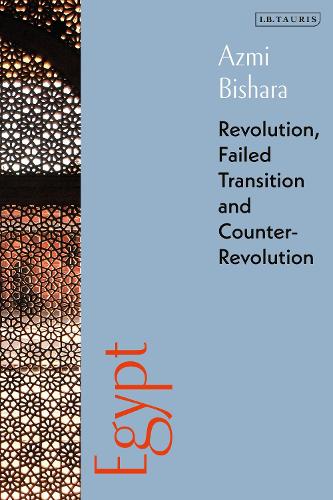
Egypt: Revolution, Failed Transition and Counter-Revolution
(Paperback)
Available Formats
Publishing Details
Egypt: Revolution, Failed Transition and Counter-Revolution
By (Author) Azmi Bishara
Bloomsbury Publishing PLC
I.B. Tauris
22nd February 2024
United Kingdom
Classifications
Professional and Scholarly
Non Fiction
Middle Eastern history
Civil wars
962
Physical Properties
Paperback
746
Width 154mm, Height 232mm, Spine 42mm
1100g
Description
Azmi Bisharas seminal study of the 2011 Egyptian Revolution chronicles in granular detail the lead up to the momentous uprisings and the subsequent transition and coup. The book critically investigates the social and economic conditions that formed the backdrop to the revolution and the complex challenges posed by the transition from authoritarianism to democracy. Part One, From July Coup to January Revolution, goes back to what is called the 1952 revolution or the 1952 Coup d'tat and traces events until 2011 when Hosni Mubarak stepped down as the president of Egypt after weeks of protest. It highlights the relationship between the presidency and the army to show that, contrary to popular belief, the presidency grew gradually stronger at the expense of other institutions, especially the army, and reached its apogee under Mubarak. Part Two From Revolution to Coup d'Etat, covers the critical stages from when the military junta took over the governing of Egypt as the Supreme Council of the Armed Forces (SCAF), and the election of Morsi, up until the coup to overthrow his presidency. Using a democratic transition theory perspective, Azmi Bishara explains the failure of the democratic transition and how it has impacted on Arab revolutions ever since. Written while the revolutions were taking place, this book conveys a sense of immediacy and urgency as Bishara makes wide-ranging assessments with many of his forecasts corroborated in later years. The book is renowned for its use of primary source material - including interviews, statistics and public opinion polls thus preserving the memory of the revolution and remaining one of the most comprehensive reference books on the subject to date.
Reviews
This is an encyclopedic and cogent work that provides a comprehensive, rich, and detailed account of contemporary politics in Egypt from 1952 until the coup of 2013. It thoroughly explores social, political, and economic factors that shaped Egypt's contemporary history with a particular focus on the role of the Egyptian military in defining Egypts politics and society over the past seven decades. An essential read for anyone interested in learning about Egypt's political evolution particularly after the January uprising of 2011. -- Khalil al-Anani, Doha Institute for Graduate Studies, Qatar
Bishara has written a non-fiction, Egyptian equivalent of War and Peace. His prodigious undertaking traces the historical underpinnings of the militarys rule back to the Ottoman era, then chronicles and analyzes in detail the uprising against Mubaraks regime in 2011, followed by the armys bloody, repressive reconsolidation of power. Far from being just a dry analysis, Bisharas very readable account brings events and broader trends alive by recounting the thinking and behaviour of those involved, whether presidents or proletarians. -- Professor Robert Springborg * Middle East Institute *
Bishara offers a fine-grained account of the 2011 uprising and its aftermath, culminating in the July 2013 coup. He presents this complex story clearly and documents it in extensive detail. In addition, he offers a distinctive argument grounded in the premise that mass popular movements can become revolutions only under specific economic, political, social, and cultural conditions. He then examines why these conditions failed to emerge in Egypt. This is an insightful and original addition to the literatures on Egypt, social movements, and revolutions. -- Professor Bruce Rutherford * Colgate University *
A masterful work by one of the Arab world's leading scholars and political analysts. Entwining threads of economic, political, social, historical and media analysis, and drawing on a large number of interviews of activists from Cairo and the provinces as well as a wealth of original and secondary Arabic language sources generally not consulted by western analysts, Azmi Bishara provides expansive as well as in-depth analysis of the January 25 revolution, the counter-revolution of 2013, and the brutal end to the hopes for a transition to democracy. Filled with fascinating insights, from the broad strokes of modern Egyptian history to the compelling chronicling of the unfolding of these monumental events, Bisharas work details coordination, competition, betrayal, repression, corruption, and bloody violence as shaped by the many actors and institutions who played key roles: ancien regime figures, the army, the police, the judiciary, the media, the traditional political parties, business elites, the Muslim Brotherhood, young revolutionaries from across the political spectrum, and external powers. Clear-eyed in assessing responsibility for successes and ultimate failures, Bishara presents a complex story of miscalculations, polarization, political navet,ruthless realpolitik, critical junctures and the contingencies of history. Egypt: Revolution, Failed Transition and Counter-Revolution will appeal to scholars, while also being compelling reading for a broader public. -- Professor Laurie A. Brand * University of Southern California *
Author Bio
Azmi Bishara is an Arab intellectual, political writer and one of the most prominent scholars in the Arab world for his work on global issues and the Arab region in particular. Bishara is currently the General Director of the Arab Center for Research and Policy Studies in Doha, Qatar, and chairs the Board of Trustees of the Doha Institute for Graduate Studies, Qatar. Bishara received the Ibn Rushd Prize for Free Thought in 2002 and the Human Rights Award from Global Exchange in 2003. He is one of the most prominent critics of authoritarianism and a staunch supporter of democratic transitions in the region.
